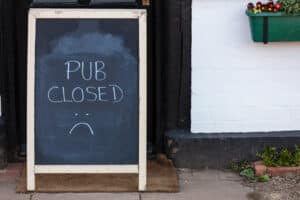
The number of pubs in England and Wales continues to fall, hitting its lowest level on record, according to new research.
There were 39,970 pubs in June, down by more than 7,000 since 2012, said real estate consultancy Altus Group.
After struggling through Covid the industry now faced soaring prices and higher energy costs, it warned.
The government said it had slashed taxes to help, but industry groups urged it to do more.
Over the last decade thousands of pubs have closed as younger people drink less, supermarkets sell cheaper alcohol and the industry complains of being too heavily taxed.
But in 2019 figures from the Office for National Statistics suggested the sector was turning a corner as it expanded for the first time in a decade.
It declined again during the pandemic, however, as lockdowns forced pubs to shut or implement strict social distancing rules.
According to Altus, 400 pubs in England and Wales closed last year and some 200 shut in the first half of 2022 as inflation started to eat into their profits. That brought the total number of pubs down to its lowest since Altus’s records began in 2005.
Robert Hayton, head of Altus in the UK, said: “Whilst pubs proved remarkably resilient during the pandemic, they’re now facing new headwinds grappling with the cost of doing business in a crisis through soaring energy costs, inflationary pressures and tax rises.”
According to the research, the West Midlands saw the biggest number of pub closures in the first six months of 2022, with 28 shutting.
It was followed by London and the East of England which both lost 24.
Altus said that pubs which had “disappeared” from the communities they once served had either been demolished or converted for other purposes, meaning that they were “lost forever”.
Inflationary pressures
The chief executive of UK Hospitality, Kate Nicholls, said the pub closure figures were “truly shocking but will come as no surprise to many in the industry”.
“We need the government to take urgent steps to remove barriers to growth, help to tackle the cost crisis we’re facing and support more people into work and training,” she said.
“Without this help, we could see thousands more pubs lost from their communities in the next few years.”
Emma McClarkin, chief executive of the British Beer and Pub Association (BBPA), said: “When pubs are forced to close it’s a huge loss to the local community, and these numbers paint a devastating picture of how pubs are being lost in villages, towns and cities across the country.
“As a sector we have just weathered the hardest two years on memory, and we now face the challenge of extreme rising costs,” she added.
“It’s essential that we receive relief to ease these pressures or we really do risk losing more pubs year on year.”
According to research from the BBPA, the British Institute of Innkeeping and UK Hospitality, only 37% of hospitality businesses are currently turning a profit.
Those surveyed said the rising costs of energy, goods and labour were most to blame.
In the past week, pub bosses have also warned that summer rail strikes could hit their profits by further weakening consumer demand.
The government said it could not control the “global factors” pushing up inflation but continued to support the hospitality sector.
“We’ve cut taxes for hundreds of thousands of businesses by increasing the Employment Allowance while slashing fuel duty,” a spokesman said.
“We’ve also introduced a 50% business rates relief for eligible High Street businesses and prevented bill increases by freezing the business rates multiplier, saving businesses £4.6bn over the next five years.”
Read more:
Last orders as pub numbers fall to lowest on record